Veterinary Advice Online: Vaccinating the Pregnant Dog.
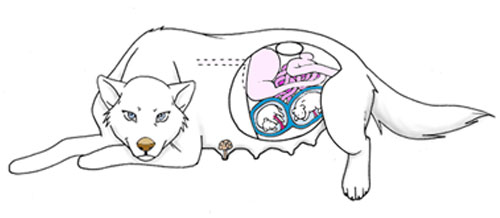
As a general rule, the average pet owner will not need to immunize a female
dog that has happened to fall pregnant. If the bitch is nicely up to date with all of her vaccines, then there is usually no real need to give an extra booster
vaccination just because of her pregnancy.

Situations in which you might consider vaccinating a pregnant bitch:
A) A small mishap in planning: the vaccination is overdue and now she is pregnant. Everyone
is time poor these days and it can be very easy to forget when your dog last had
her needles, particularly if your veterinarian does not routinely send out reminder letters. If your bitch should become overdue for immunization and then fall pregnant, you have two
choices:
1) you can take the risk that your house and yard are very clean and unlikely to be an infection risk to your bitch or puppies and wait until after the pups are born to get the bitch her recommended live vaccines. This should only be considered if there has never been a case of parvovirus, distemper virus or hepatitis on the property (parvo in particular
is very long lasting and will survive in the environment for years). Regardless of prior
virus contamination of the environment, this strategy should be considered to be of some risk because pregnant females are often nutrient-deficient (expending energy and nutrients in growing the pups) and under a lot of stress - both situations in which the immune system's ability to fight naturally-occurring virus diseases may be reduced.
2) vaccinate your bitch - there are also potential risks here (no inoculation is 100% safe), however they are minimal if the
correct type of vaccine is used and correct procedure is followed. Risks of vaccination (for any animal) are discussed in detail
on our
Vaccination Side Effects page and indications and contraindications of live and killed vaccines are discussed on our
How vaccines Work page.
B) A desire to achieve high levels of antibodies in the bitch's colostrum so that
the pups are better protected.
Some breeders vaccinate all their bitches as a routine
part of their vaccine program to avoid losing puppies to the major infections. Other breeders
limit the practice, only giving vaccines to pregnant bitches in high-infection-risk situations (e.g. a breeder that has had a lot of cases of parvovirus) as a means of trying to protect the newborn pups as much as possible. These breeders in high-risk situations
will also use additional techniques such as early puppy immunization, high-frequency
puppy immunisations and early weaning to try to save their litters.

Live vaccine injections should not be used in pregnant bitches:
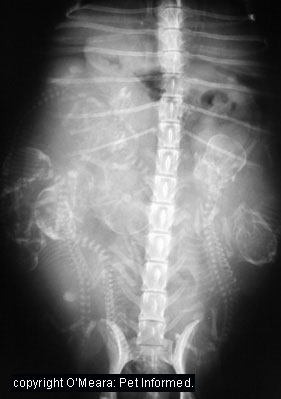 Live vaccines are vaccines comprised of low disease-risk (also termed 'live attenuated' or 'avirulent') canine viruses that are very closely related to the wild-type, disease-causing virus strains we are immunizing our pets against. Although these living vaccine viruses infect the body in similar sites and ways to the disease-causing viruses (e.g. the avirulent parvo vaccine virus replicates in the same
region of intestine as the wild-type parvovirus does), their ability to cause disease is so
limited it is unlikely that normal animals vaccinated with these viruses will go on to show
any signs of illness as a result of inoculation.
Live vaccines are vaccines comprised of low disease-risk (also termed 'live attenuated' or 'avirulent') canine viruses that are very closely related to the wild-type, disease-causing virus strains we are immunizing our pets against. Although these living vaccine viruses infect the body in similar sites and ways to the disease-causing viruses (e.g. the avirulent parvo vaccine virus replicates in the same
region of intestine as the wild-type parvovirus does), their ability to cause disease is so
limited it is unlikely that normal animals vaccinated with these viruses will go on to show
any signs of illness as a result of inoculation.
Pregnant animals, on the other hand, are not 'normal animals' and nor are their unborn puppies. Pregnant
bitches are generally under physiological stress and often exist in a nutrient deficient state. Consequently, their immune system responses
may be poorer, resulting in a greater risk of disease manifesting, even with the avirulent forms of virus contained in the live vaccines. The unborn puppies have minimal immune system maturity
at all and are unlikely to be unable to defend themselves against the live viruses contained in the vaccines. Since
some of live vaccine viruses (e.g. the parvo viruses) specifically target dividing cells of the body
(e.g. parvovirus targets the rapidly mitosing gut and bone marrow of adult dogs), they will preferentially infect the
foetus/embryo in which lots of cells are dividing (mitosing) at once. Infection of the foetus
can result in abortions, stillbirths and birth defects.
For detailed information on live vaccines and how vaccines induce immunity, please visit our How Vaccines Work page.

Killed vaccines are indicated for use in pregnant bitches:
Killed vaccines are vaccines containing:
1) Inactivated (killed), whole virus/bacteria organisms (e.g. dead distemper viruses, dead parvoviruses, dead kennel cough organisms) OR
2) Several small, highly immune-system-stimulating sections of the viral/bacterial organism. Termed antigens, these chosen sections are molecules of proteins and/or sugars found on the surface of the organism, which the animal's immune system needs to recognise in order to induce protective immunity. These killed vaccines
made up of incomplete virus or bacteria components are termed 'subunit vaccines'.
3) Immune-stimulatory additives (adjuvants). In order to make inactivated vaccines more effective at inducing immunity, immune-stimulating additives (termed adjuvants) are usually added to killed and subunit vaccines. These compounds can take many forms
(e.g. metal salts, bacterial proteins, proteins, sugars, oils, even chemical messengers of the immune system itself) all designed to increase the immune system response in the vaccine region and improve antigen uptake.
For the purposes of this particular discussion, we will group the killed and subunit vaccines
under the one label: killed vaccines. But you can read all about killed and subunit vaccines and how these vaccines induce immunity by visiting our How Vaccines Work page. The page also contains
a great section outlining the pros and cons of the different types of vaccine.
Why are killed vaccines safer than live vaccines in pregnant bitches?
The reason killed vaccines are safer to use during pregnancy than live vaccines is that these vaccines are made up of inactivated viruses (or bacteria) and/or incomplete virus sections.
As a result, no replication of the vaccine virus (or bacteria) can occur within the animal's body and it is unable to harm the bitch or her embryos directly.
What are the potential problems with using killed vaccines in pregnant bitches?
Because killed vaccine viruses do not replicate in the body like the live vaccine viruses do, the immune system response does not get reinforced and amplified by the presence of more and more replicated virus particles appearing in the body (i.e. a bigger dose of viral antigens for the body to recognise). As a result, the protective immune response that occurs following the administration of a killed vaccine tends to be of shorter duration and magnitude than the response that occurs following a live vaccine. Both cell mediated and humoral immunity are much poorer with killed vaccines (visit our how vaccines work page for details on these terms), unless plenty of reactive adjuvants are included in the inoculation. But, as you will see in the next section, these adjuvants come with their own issues.
The addition of immune stimulatory adjuvants to killed vaccines results in there being a
much greater risk of an allergic reaction or injection site reaction (see vaccine side effects page) occurring as a consequence of killed vaccine administration. This is because these
compounds have to be so intrinsically reactive in order to have their desired effect. Put in simple terms, the body can basically see these compounds as being so utterly foreign to it that it deems it necessary to launch an aggressive immune attack on them. As
mentioned above, this enhanced immune attack is helpful in that it improves the immune protective response developed towards the killed vaccine, however, should the reaction
be taken too far, the result can be anaphylaxis or severe inflammatory reactions
at the site of injection. The risk of severe reaction (such as anaphylaxis) is further compounded
by the fact that these vaccines often contain massive amounts of antigenic viral/bacterial material in them
(much more than the self-replicating live virus vaccines do) and the fact that the animal usually has to have at least two injections in order to be considered adequately protected (the
initial injection sensitises the animal's immune system to the vaccine composites, resulting
in a massively inappropriate immune response being directed towards the subsequent inoculation).
The allergic reaction issue should not be taken lightly. Remember that, although many killed vaccines are registered for use in expectant bitches and, for the most part, are very safe to use, there is always the risk that your bitch could be the one to suffer a life-threatening allergic reaction (e.g. anaphylaxis). In a pregnant animal, the sudden cardiovascular collapse and severe drop in blood pressure suffered during an anaphylactic reaction could potentially result in the death of the bitch or
her foetuses or potentially induce the bitch to abort her babies.
Premedication with a non-corticosteroid-containing anti-histamine might be indicated if an animal is likely to react
towards vaccination. This is particularly the case if the needle in question is a booster
injection or the second or third in a series of vaccinations (this hints that the animal might have already been sensitised to the vaccine and that it may be more likely to react).
You can read more on anaphylaxis treatment and prevention and the side effects and risks associated with vaccination by heading to our
vaccine side effects page.
Note that some companies still exclude pregnant bitches from their killed vaccine regimens and these recommendations must be obeyed.

Intranasal vaccines and the Pregnant Bitch:
Intranasal vaccines are live attenuated vaccines which are not injected, but which are instead given up the nostrils of the animal. Given to vaccinate against the respiratory disease pathogens (e.g. Bordetella, parainfluenza and occasionally
a form of kennel-cough-inducing canine adenovirus), these vaccines are administered at
the site where the respiratory viruses usually first infect an animal (the lining of the respiratory tract).
By triggering an effective immune response at the very place the respiratory viruses/bacteria
prefer to attack (i.e. the most likely site of infection), intranasal vaccinations are the preferred means of preventing kennel cough in almost any dog, regardless of pregnancy.
Because intranasal vaccines replicate in the respiratory tract, they should, theoretically,
not affect the bitch or her foetuses. Therefore, they should be safe for the vaccination of pregnant dogs.
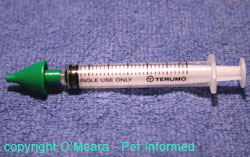
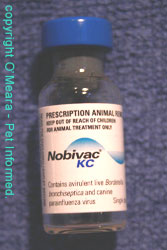
Note that some companies still exclude pregnant bitches from their intranasal vaccine regimens and these recommendations must be obeyed.

Vaccines available on the market for pregnant bitches.
There are a small number of killed and intranasal vaccines available on the market which have been registered for use in expectant mothers. These include the following:
Killed vaccines:
Parvovirus: Parvac (vaccine made by CSL), Canine parvovirus vaccine (inactivated) (vaccine made by Fort Dodge).
Bordetella bronchiseptica (bacterial component of kennel cough): Canvac BB (vaccine manufacturers - CSL), Protech Duramune BB (Fort Dodge).
Intranasal vaccines:
Kennel cough (Bordetella and parainfluenza): Nobivac KC (Intervet).
Not all killed and intranasal vaccines are registered for use in pregnant animals.
Some makers of killed and intranasal vaccines still recommend in their vaccination guidelines that their products
are not suitable for use in pregnant animals. Vaccine recommendations such as these, provided by vaccine companies, should be adhered to closely. It may be that some of the
adjuvants or organisms contained in these products have simply not been tested in pregnant pets or it may be that they have been tested and not been found to be safe for this application.

The issue of maternal immunity in the pups of bitches vaccinated during pregnancy.
Bitches not vaccinated during pregnancy:
Bitches that have received a normal course of vaccinations (i.e. are up-to-date with their vaccines,
but have not been vaccinated during pregnancy) contain antibodies in their blood
that are designed to protect them from infection by disease-causing, wild-type viruses and bacteria which are present in the environment. When a bitch starts lactating, some of her protective antibodies enter the colostrum (first milk). When the puppies drink this colostrum
in the first 24 hours of life the antibodies (termed maternal antibodies or maternal immunity)
consumed get absorbed into the blood of the pups, protecting them from these vaccinated-against viruses and bacteria while their own immune systems develop. It is an effective system: maternal immunity protects newborn puppies from a large
number of diseases (not just vaccinated-for disease). Pups that do not get colostrum are prone to severe infections and many will die.
The problem with maternal immunity is that whilst the mother-dog's antibodies remain present in the pup's body, they will target and destroy the avirulent, live viruses contained in the vaccines we give to the pup (starting at 6 weeks). This prevents the puppy's own immune system from being exposed to the viruses in the vaccines that we give them and, without this antigenic exposure, the pup may not develop sufficient, protective immunity against these terrible diseases.
In the normal situation (the puppies of bitches not vaccinated during pregnancy)
we hope that maternal immunity will not last too long: that it will wear off well before the pup reaches the age of 12 weeks (ideally it should wear off between 8-12 weeks). This
absence of maternal immunity would allow the pup's own immune system to be exposed to the vaccine antigens administered during the 10-12 week and 16 week vaccinations (depending on the individual vaccine schedule). As a result, the puppy would develop a protective immune response against the virulent strains of these organisms, present in the environment.
Bitches vaccinated during pregnancy:
When bitches are vaccinated during pregnancy, their blood antibody levels towards that vaccinated-against virus (parvovirus is normally the vaccine type given) increase to very high titers, peak levels being achieved approximately 2 weeks after vaccination. The increase
in blood antibody levels in the bitch is reflected in her colostrum, which also contains higher levels
of longer-lasting antibody. Consequently, the level of maternal antibody protection afforded
the pups is very high (this extra protection could be very handy in an environment
where there is or has been parvovirus contamination). The trouble with this high-level
of maternal immunity is, however, that these antibodies may persist for ages, well out to 12-14 weeks. The naive immune systems of the vaccinated pups may not get exposed to the initial (6-8 week, 12 week) vaccines and a 16-18 week vaccine may be required in order for the pups to be fully protected.
Giving a 16-18 week vaccination is not a problem, with regard to vaccination. Vaccines given by vets are generally very safe and most can be given at 16 weeks (even 20 weeks in some situations) to puppies.
The issue comes with socialization. It is important for puppies to meet and play with other puppies, 'strange' humans and different animal species (cats etc.) in the early weeks of life (from 7-14 weeks of age) so that they develop emotionally and learn the correct behaviors appropriate
to interacting with other animals and people. If a puppy does not receive this valuable interaction before 14 weeks of life, much of the opportunity for him to develop good social graces
can be lost, resulting a dog with fearful and behavioral issues for the rest of
his life. Now, in order for any puppy to go out into public and socialise, that puppy must be fully vaccinated against disease. The problem comes when we aim for high levels of maternal immunity in our puppies: if a puppy is unable to be fully vaccine-protected until 16-18 weeks and, as a result, is unable to interact with other animals until 16-18 weeks, then he or she is naturally going to miss out on that critical 14-week cut-off point for valuable socialisation.
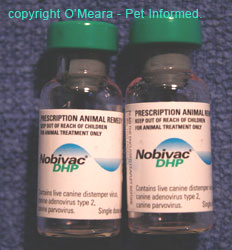 So, does this mean that it is bad to vaccinate pregnant bitches to increase maternal
immunity?
So, does this mean that it is bad to vaccinate pregnant bitches to increase maternal
immunity?
Absolutely not. There are now new vaccines coming onto the veterinary market which claim to overcome
maternal immunity very well and which are completed by 10-12 weeks, allowing plenty of
socialisation and public appearances before 14 weeks. See the New Immunization
Schedules section on the Dog Vaccination Schedule page for more information.
Additional note: a percentage of pups born from bitches not vaccinated during pregnancy may also have persistent maternal antibody levels out to 14 weeks of age. The same issues of vaccination
and socialisation apply to them as for the pups of bitches that were vaccinated during pregnancy. The newer vaccination products and immunization schedules coming onto the market will also cater for these puppies.

Take home messages - immunizing the pregnant female dog:
Never use a live vaccine in a pregnant bitch: only use registered 'safe' killed vaccines and registered
'safe' intranasal vaccines.
Keep up to date with live vaccines in non-pregnant bitches to avoid having to give vaccines to pregnant bitches.
Killed parvovirus vaccines can be given 2 weeks or more before the pups are due to be born (they should not be given
any closer to the time of birth than this) to increase the levels of parvovirus antibodies in the colostrum.
Maternal antibody levels may persist in these antibody-enriched pups for up to 14 weeks and, depending on the vaccine type being given to these pups, they may require preventative vaccinations for up to 16-18 weeks of age before they are considered safe to socialise. Newer vaccines are now
available that overcome this issue of maternal immunity, achieving full protection within 12 weeks of age.
If using vaccination therapeutically, in order to achieve high levels of immunoglobulins (antibodies)
in the colostrum, vaccinate the pregnant bitch 2-3 weeks before the pups are due to be born.
Although killed vaccines are effective as a means of infectious disease prevention (prophylaxis) and are registered for use in pregnant and otherwise compromised animals, we should not consider these vaccines to be as effective as the live attenuated vaccines and nor should we consider them to be 100% safe. Live vaccines are the type of vaccines that should be used in normal animals unless they are unavailable for a particular organism (e.g. leptospira vaccines are generally killed vaccines) or there is a specific contraindication for their usage.

To go from this Vaccinating the Pregnant Dog page to the Homepage, click here.

References and Suggested Readings:
1) Prevention of Infectious Diseases. In Nelson RW, Couto CG, editors: Small Animal Internal Medicine, Sydney, 1998, Mosby Inc.
2) Greene CE, Immunoprophylaxis. In Greene CE, editor: Infectious Diseases of the Dog and Cat, St. Louis, 2006, Saunders Elsevier.
3) Greene CE, Canine Viral Enteritis. In Greene CE, editor: Infectious Diseases of the Dog and Cat, St. Louis, 2006, Saunders Elsevier.
4) Resistance of the Body to Infection: II. Immunity and Allergy. In Guyton AC, Hall JE, editors: Textbook of Medical Physiology, Philadelphia, 1996, WB Saunders Company.
5) Immunotherapy. In Wroth O, editor: MIMS IVS Annual. St Leonards, 2001, Havas MediMedia.
6) Hoskins JD, Canine Viral Diseases. In Ettinger SJ, Feldman EC, editors: Textbook of Veterinary
Internal Medicine, Sydney, 2000, WB Saunders Company.
7) Information on Nobivac DHP and Nobivac KC taken from information provided by Intervet Australia Pty Limited, 2007.

Pet Informed is not in any way affiliated with any of the companies whose products
appear in images or information contained within this article. The images, taken by Pet Informed, are only used in order to illustrate certain points being made in the article.
Copyright March 2008, www.pet-informed-veterinary-advice-online.com. TM.
All rights reserved, protected under Australian copyright. No images or graphics on this Pet Informed website may be used without written permission of their owner, Dr. O'Meara BVSc (Hon).
Duramune, Protech and Fort Dodge are registered trademarks of Wyeth and its affiliates.
Nobivac is a registered trademark of Intervet.
Parvac and Canvac BB are registered trademarks of CSL.
Please note: the aforementioned puppy vaccination schedules, adult dog vaccination
guidelines, pregnancy vaccination guidelines and information on the new immunization schedules now being made available are general recommendations only.
The information provided is based on published information and recommendations made available from the vaccine companies themselves; relevant veterinary literature
and publications and my own experience as a practicing veterinarian.
The advice given is appropriate to the vast majority of pet owners however, given
the large range of vaccine types and protocols now available, owners should take it upon themselves to ask their own veterinarian what vaccination schedules s/he is using so as
to be certain what to do. Owners with specific circumstances (high parvovirus
contamination in environment, black and tan dog breeds, pregnant bitches, animals on immune-suppressant medicines etc. etc.) should ask their vet what the safest and
most effective protocol is for their situation.
Any dose rates mentioned on these pages should be confirmed by a vet. Dosing rates for common
drugs are being changed and updated all the time (e.g. as new research comes in and as drug
formulations change) and information here may not remain current for long. What's more, although we try very hard to maintain the accuracy of our information, typos and oversights do occur. Please check with your vet before dosing any pet any medication or drug.

 Live vaccines are vaccines comprised of low disease-risk (also termed 'live attenuated' or 'avirulent') canine viruses that are very closely related to the wild-type, disease-causing virus strains we are immunizing our pets against. Although these living vaccine viruses infect the body in similar sites and ways to the disease-causing viruses (e.g. the avirulent parvo vaccine virus replicates in the same
region of intestine as the wild-type parvovirus does), their ability to cause disease is so
limited it is unlikely that normal animals vaccinated with these viruses will go on to show
any signs of illness as a result of inoculation.
Live vaccines are vaccines comprised of low disease-risk (also termed 'live attenuated' or 'avirulent') canine viruses that are very closely related to the wild-type, disease-causing virus strains we are immunizing our pets against. Although these living vaccine viruses infect the body in similar sites and ways to the disease-causing viruses (e.g. the avirulent parvo vaccine virus replicates in the same
region of intestine as the wild-type parvovirus does), their ability to cause disease is so
limited it is unlikely that normal animals vaccinated with these viruses will go on to show
any signs of illness as a result of inoculation. 

 So, does this mean that it is bad to vaccinate pregnant bitches to increase maternal
immunity?
So, does this mean that it is bad to vaccinate pregnant bitches to increase maternal
immunity?